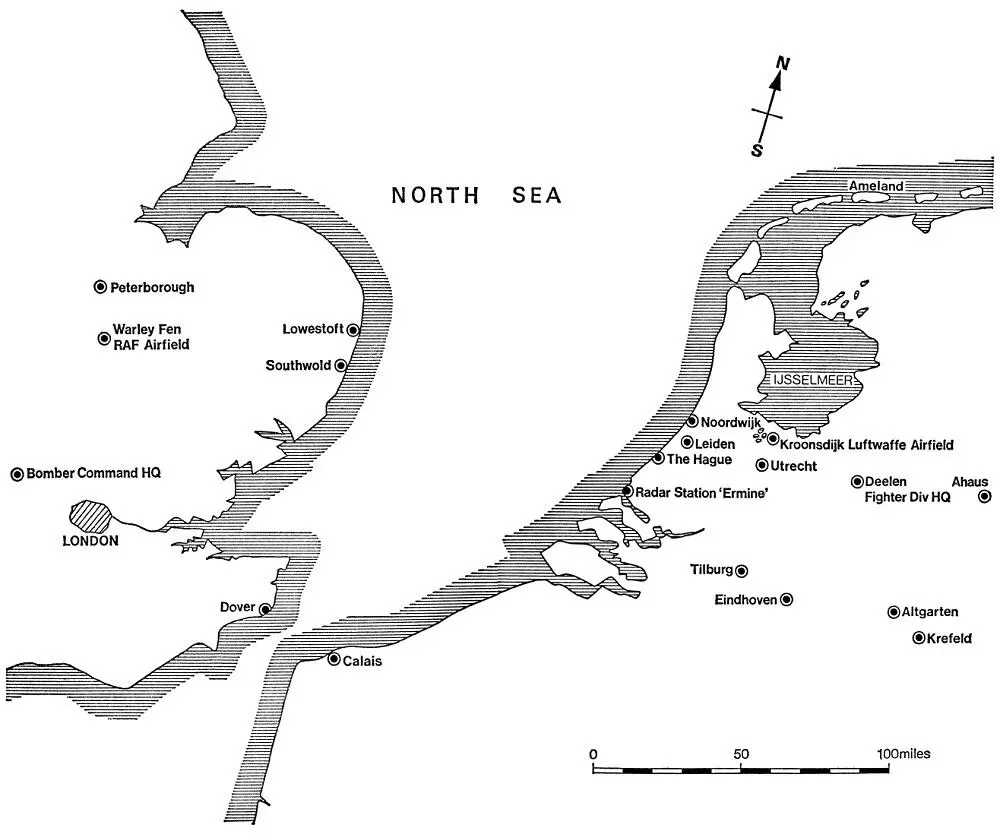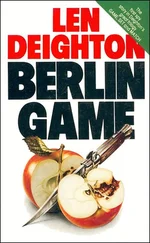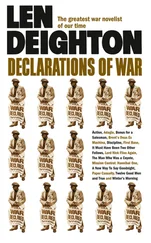LEN DEIGHTON
Events relating to the last flight of an RAF Bomber over Germany on the night of June 31st, 1943

Published by HarperCollins Publishers Ltd 1 London Bridge Street London SE1 9GF
www.harpercollins.co.uk
First published in Great Britain by Jonathan Cape Ltd 1970
Copyright © Pluriform Publishing Company BV 1970
Introduction copyright © Pluriform Publishing Company BV 2009
Len Deighton asserts the moral right to be identified as the author of this work
Cover design © Arnold Schwartzman 2009
The words from the song ‘Easy Come, Easy Go’ (composed by John Green and written by Edward Heyman; copyright 1934 by Warner Bros 7 Arts Music) are reproduced by kind permission of Chappell & Co Ltd
A catalogue record for this book is available from the British Library
This novel is entirely a work of fiction. The names, characters and incidents portrayed in it are the work of the author’s imagination. Any resemblance to actual persons, living or dead, events or localities is entirely coincidental.
All rights reserved under International and Pan-American Copyright Conventions. By payment of the required fees, you have been granted the nonexclusive, nontransferable right to access and read the text of this e-book on-screen. No part of this text may be reproduced, transmitted, downloaded, decompiled, reverse engineered, or stored in or introduced into any information storage and retrieval system, in any form or by any means, whether electronic or mechanical, now known or hereinafter invented, without the express written permission of HarperCollins e-books.
HarperCollins Publishers has made every reasonable effort to ensure that any picture content and written content in this ebook has been included or removed in accordance with the contractual and technological constraints in operation at the time of publication.
Source ISBN: 9780586045442
Ebook Edition © OCTOBER 2009 ISBN: 9780007347728
Version: 2017-05-22
Ritual: A system of religious or magical ceremonies or procedures frequently with special forms of words or a special (and secret) vocabulary, and usually associated with important occasions or actions.
Dr J. Dever,
Dictionary of Psychology (Penguin Books)
Between February 1965 and July 31st, 1968, the American bombing missions in Vietnam numbered 107,700. The tonnage of bombs and rockets totalled 2,581,876.
Keisinger’s Continuous Archives
The attitude of the gallant Six Hundred which so aroused Lord Tennyson’s admiration arose from the fact that the least disposition to ask the reason why was discouraged by tricing the would-be inquirer to the triangle and flogging him into insensibility.
F. J. Veale,
Advance to Barbarism (Mitre Press, 1968)
Cover
Title Page
Copyright
Epigraph
Map
Introduction
Chapter One
Chapter Two
Chapter Three
Chapter Four
Chapter Five
Chapter Six
Chapter Seven
Chapter Eight
Chapter Nine
Chapter Ten
Chapter Eleven
Chapter Twelve
Chapter Thirteen
Chapter Fourteen
Chapter Fifteen
Chapter Sixteen
Chapter Seventeen
Chapter Eighteen
Chapter Nineteen
Chapter Twenty
Chapter Twenty-One
Chapter Twenty-Two
Chapter Twenty-Three
Chapter Twenty-Four
Chapter Twenty-Five
Chapter Twenty-Six
Chapter Twenty-Seven
Chapter Twenty-Eight
Chapter Twenty-Nine
Chapter Thirty
Chapter Thirty-One
Chapter Thirty-Two
Chapter Thirty-Three
Chapter Thirty-Four
Epilogue
Acknowledgements
Keep Reading
About the Author
Also by the Author
About the Publisher

Bomber was the first fiction book written using what is now called a ‘word processor’. In 1969 that name did not exist. It was an IBM engineer visiting my home at the Elephant and Castle in London to check my golfball typewriter, who asked me: ‘ Do you know how many times your secretary has retyped this chapter ?’ He waved pages in the air.
‘ Half a dozen times ?’ I said defensively. I knew my wonderful Australian secretary Ellenor Handley retyped chapters only when her typewritten words were almost obscured by my handwritten changes.
‘ Twenty-five times ,’ said the IBM man. ‘ Your poor secretary! ’
I tried to look repentant.
Along the street at the mighty Shell Centre, IBM had installed banks of computer-driven machines that produced printed in-house essentials such as instruction manuals.
‘ Come along and see them ,’ urged the IBM man. Being somewhat obsessed by machinery (while not really understanding it) I went along. Soon I became the only private individual permitted ownership of an IBM MT 72 computer. It was the size and shape of a small upright piano. I was very proud of that machine, I showed it to everyone who visited me, but it was Ellenor who mastered it.
My friend Julian Symons, the writer and doyen of critics, said I was the only person he knew who actually liked machines. ‘ Perhaps you should write a book about them ’, he said, only half seriously. That was the start of Bomber . Does everyone hate machines? Perhaps they do; so suppose I wrote a story in which the machines of one nation battled against the machines of another? Yes, I knew about that. I had been bombed every night for months at a time in London. The night bombing campaigns were fought in complete darkness, with both the enemy aircraft and the terrain below depicted only as tiny blips and blobs on glass screens. The combatants never saw their enemies. It had a spooky fascination for me but would such a grim mechanical theme overshadow a story’s human element?
The human element was already a difficult aspect of writing such a story. Most of the characters – both British and German – would be able-bodied young men chosen for their physical, emotional and psychological similarity. To make it more difficult, my preliminary notes showed that I would need a cast of well over a hundred of these similar young people. This meant a style that would bring a character to life in only a sentence or two of dialogue. And do it well enough for the reader to pick up on that character two or three chapters later. And I was determined to do it without resorting to crude regional pronunciations.
It was daunting. I began to talk to experts and discovered how deep I was going to have to dig for my research. German radar was very advanced by 1943; it was only after that that Anglo American technology took the lead. But the Germans lost their technical lead and lost the war too. That meant that very few people had taken any interest in the history of German air defences. I went to Germany and sought out the technicians and radar operators as well as the night-fighter pilots and Flak crews. Then I had to put their explanations together well enough to understand the basis of the German air defence system. The more I learned about it, the more it fascinated me.
If 1943 German radar controllers and night-fighter veterans were a complex challenge, then wait until I started to delve into the social life, scandals and Nazi-led politics of a small Westphalian town. Everyone seemed to have a war story. One lady found for me some striped overalls that she had made from her nurse’s uniform. A man I met in a restaurant had kept all his wartime documents and when I showed interest in them insisted that I kept them. My wife Ysabele’s fluent German was the key to this conversational research and greatly expanded the number of people and stories available to me.
Читать дальше














